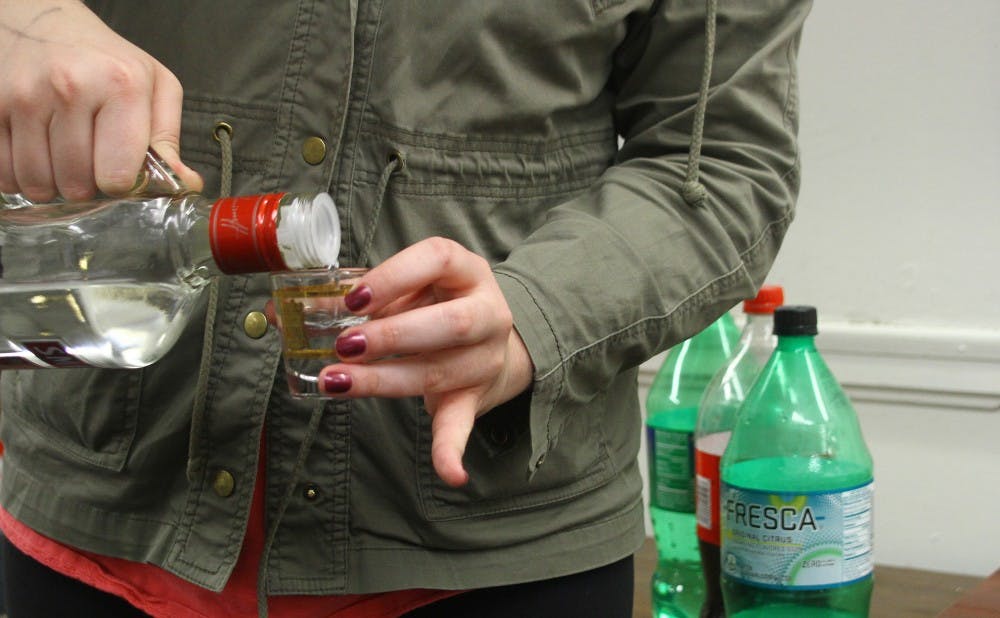As peer institutions continue to vary their alcohol policies, Duke administrators stand by the University's approach.
Dartmouth College imposed a campus-wide ban on hard liquor two weeks ago, joining the ranks of schools including Bowdoin and Bates Colleges. The ban is among a number of practices adopted in recent years to crack down on high-risk behaviors on college campuses across the country—as Duke continues to support its own policies.
Larry Moneta, vice president for student affairs, noted that Duke's approach to alcohol is not the responsibility of one office but is instead more multifaceted—enforced and supported through services such as the Wellness Center; Housing, Dining and Residence Life; the Office of Fraternity and Sorority Life; Counseling and Psychological Services; and Duke Reach.

Tom Szigethy, associate dean and director of Duke's Wellness Center, noted that the Wellness Center’s role in preventing alcohol abuse on campus is to inform students of the risks associated with irresponsible drinking so that students can make wiser consumption decisions.
“High risk drinking can impose many risks to students from physical injury to death,” Szigethy wrote in an email last Tuesday. “[It’s a] slippery slope of problems at Duke—students may sleep less, trying to get schoolwork done, their stress then increases and then sometimes try to cope with the stress by drinking, which is not good for their overall wellness.”
Under the Duke alcohol policy, students under 21 are not permitted to purchase, possess or consume alcoholic beverages under any circumstances. Serving hard liquor is not permitted at student events. Violations are grouped into four categories—underage possession and consumption, unsafe or irresponsible behavior, violation of community expectations and a general provisions violation.
Other peer institutions place the emphasis specifically on preventing dangerous behavior. According to its alcohol policy, Washington University in St. Louis “places its highest enforcement priority on enforcing violations that are repeated, disruptive, dangerous, and/or flagrant” rather than emphasizing all consumption by students younger than 21.
Stanford University operates under what is known by students as an “open-door policy.” This stipulates that students will not face disciplinary action for drinking in their rooms with their doors open, so that the residential staff will be able to interact with residents when needed for safety reasons.
Dartmouth’s ban on hard liquor was announced in combination with a four-year sexual violence prevention and education program. The ban will accompany a consent manual released by Dartmouth in an attempt to reduce ambiguity about what qualifies as consensual behavior and development of a smartphone app students can use to seek help in emergencies.
Hard alcohol, as defined by Dartmouth, is any beverage containing more than 15 percent alcohol by volume.
The policy was implemented to reduce the occurrence of the negative consequences of hard alcohol consumption—consequences including sexual assaults, missed classes, regretted actions and hangovers—according to Diane Lawrence, director of media relations at Dartmouth.
“Alcohol researchers indicate that, to see a substantial impact, our policy must be clear and enforcement must be consistent,” she wrote in an email Tuesday.
Lawrence said that enforcement procedures will include additional training of safety and security officers and residential life staff. The role of undergraduate advisors will also expand to include rounds when students are likely to drink in residence halls. Lawrence noted, however, that enforcement details have not yet been finalized.
Duke students expressed skepticism about a similar policy succeeding at Duke.
"I don't know how they would control that," freshman Mirko Tancredi said. "I feel like if we were to do that it wouldn't cut down consumption as much as we would like or think. It might make Shooters more crowded."
Sophomore Sarah Gorvetzian noted that enforcement would be difficult because drinking hard alcohol is "such a big part of Duke culture."
"Unsafe drinking can happen anywhere," Szigethy wrote. "When people drink in order to get drunk quickly, they increase the risk of blacking out—drinking games, shots and pre-gaming all add to this risk."
Neelesh Moorthy, Will Walker and Jenna Zhang contributed reporting.
Get The Chronicle straight to your inbox
Signup for our weekly newsletter. Cancel at any time.

